Detailed COVID timeline

January
Jan. 10: Less than two weeks after acknowledging a mysterious new disease gripping Wuhan, China provides the COVID-19 genome sequence to U.S. health officials, allowing the development of a test.
Jan. 11: China reports its first coronavirus death.
Jan. 20: The World Health Organization confirms first cases found outside China.
Jan. 21: U.S. announces its first confirmed case, in Washington state.
Jan. 31: White House announces entry ban against foreign nationals who recently traveled to China, as U.S. declares a public health emergency.
February
Feb. 2: First confirmed death outside China, in the Philippines.
Feb. 6: The Centers for Disease Control and Prevention begins shipping test kits to labs in all states. First death in U.S., a 57-year-old California woman, later traced to this day. The diagnosis had been delayed more than two months because of testing shortages.
Feb. 25: Dr. Nancy Messonnier of the CDC says that COVID-19 is heading toward pandemic status, contradicting President Donald Trump’s claim that the virus will be contained.
Feb. 26: Trump names Vice President Mike Pence to lead the coronavirus task force.
Feb. 28:
• Gov. Brian Kemp creates Georgia coronavirus task force.
• In Albany, more than 100 people attend visitation at a funeral home for a 64-year-old man, and the next day many more were at the man’s funeral. Numerous people who attended later were diagnosed with COVID-19.
Feb. 29: First known outbreak in a U.S. long-term care facility reported, in Washington state.
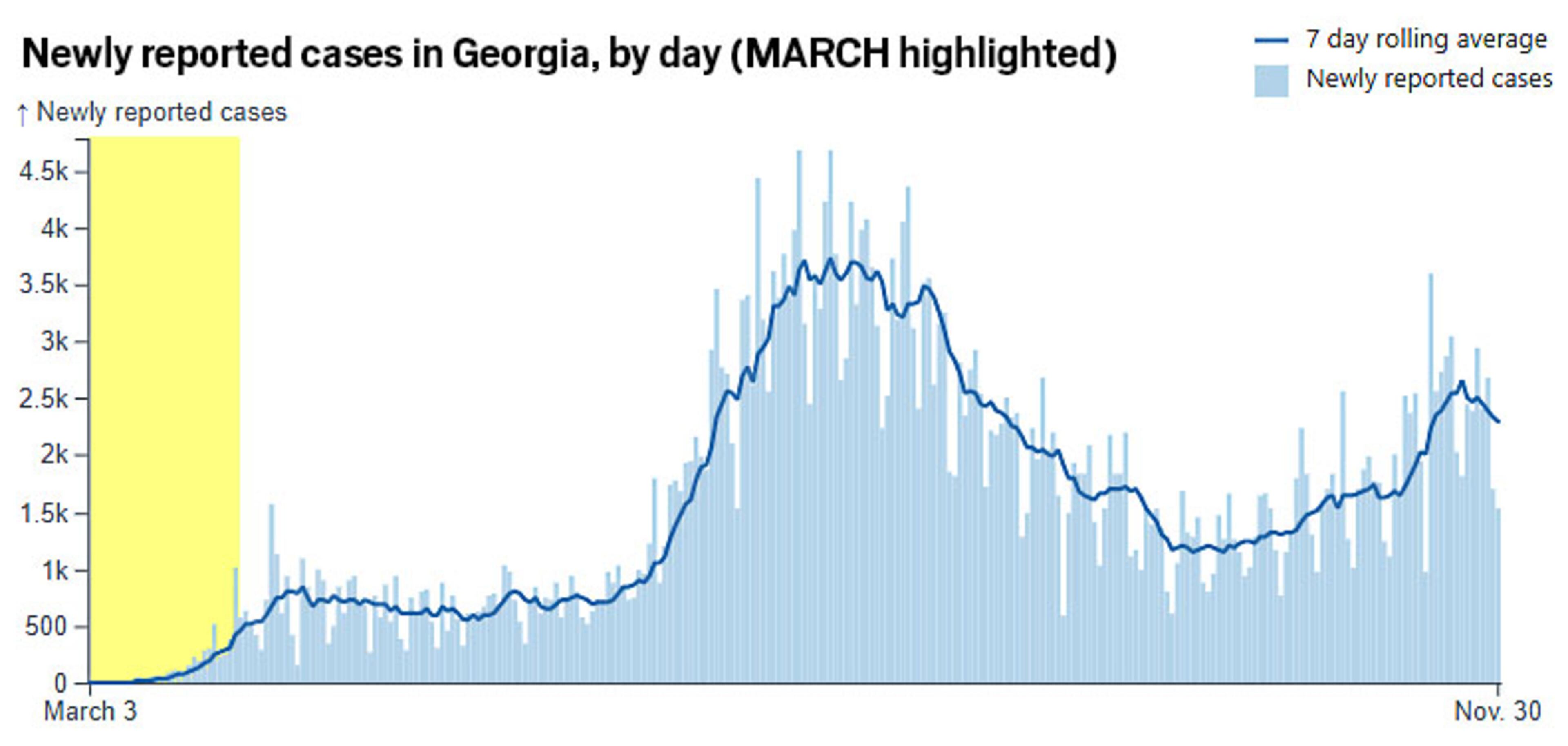
March
March 2:
• State confirms first cases in Georgia — a father and son from Fulton County who just returned from Italy in February.
• A 70-year-old man dies at Phoebe Putney Memorial Hospital, and days later his death certificate lists COVID-19 as a cause.
March 3: The first patient known to have COVID is hospitalized in Georgia, a woman who had gone to the ER in Floyd County on Feb. 28 and was sent home, then returned this date and was admitted.
March 5: Gov. Kemp gives press conference, acknowledges the heightened risk at long-term care facilities but reassures the public that the risk to most Americans is low.

March 6:
• Trump tours the CDC in Atlanta without a mask, saying anyone who needs a test can get a test.
• Trump signs an $8 million emergency spending package for coronavirus prevention, preparation and response.
March 7: Two more Georgia residents die this day, one at Emory Midtown, the other at Grady. Their death certificates later list COVID-19 as a cause.
March 9: Pence takes control of clearing CDC communications about the virus.
March 11:
• WHO officially labels the coronavirus as a pandemic.
• Trump makes primetime address, saying that for “the vast majority of Americans, the risk is very, very low.” He also bans most travel from 26 European countries.
• The NBA suspends all of its games until further notice.
• The first passengers from the Grand Princess cruise ship arrive at Dobbins Air Reserve Base for quarantine. The last ones would leave the base on March 26.
• Savannah cancels its St. Patrick’s Day parade and festivities.
March 12:
• Gov. Kemp announces what he says is the state’s first coronavirus death, a 67-year-old hospitalized at Wellstar Kennestone.
• The state also records its first confirmed cases in a senior care facility, in Cherokee County.
• Fulton County School System announces closure of all buildings starting at midnight. Cobb County closes buildings four days later. Atlanta Mayor Keisha Lance Bottoms announces teleworking for nonessential employees.
March 13:
• Trump declares national emergency. Federal government restricts visits to nursing homes.
• Major League Soccer suspends its games for 30 days.
• Georgia Legislature suspends its session.
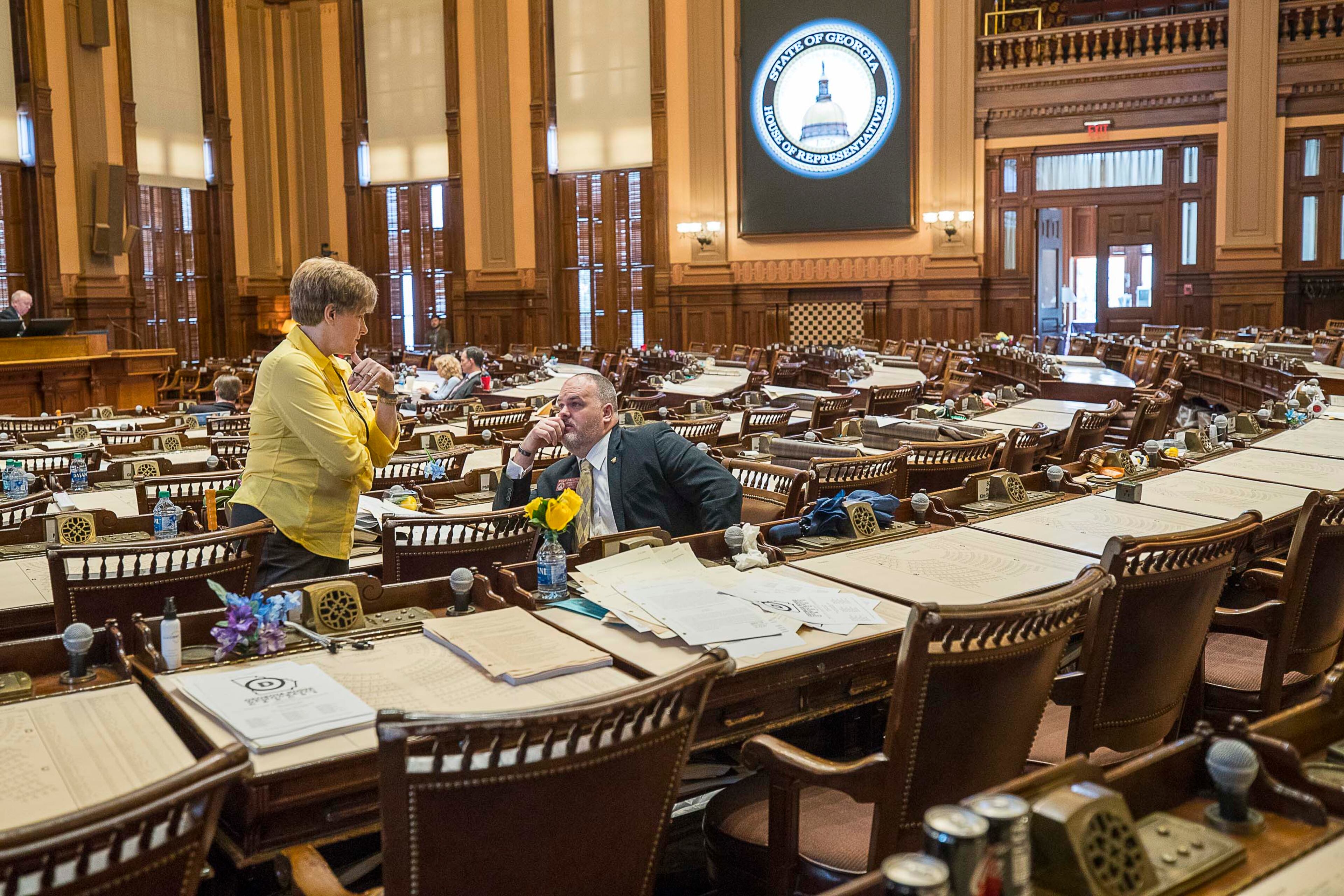
March 14:
• Gov. Kemp declares a public health state of emergency and calls up approximately 2,000 Georgia National Guard troops to help with the COVID-19 response. Trump would approve the declaration on March 29.
• Chief Justice Harold Melton of the Supreme Court of Georgia declares statewide judicial emergency.
March 15:
• U.S. extends European travel ban to include the U.K. and Ireland.
• CDC recommends that for eight weeks, all events with more than 50 people be canceled or postponed.
• Georgia later records its first COVID-related death at a nursing home on this day, in Palmyra.
• Mayor Bottoms issues citywide state of emergency prohibiting public gatherings of more than 250 people.
March 16:
• White House issues first social distancing guidelines, which include dismissing school.
• Major League Baseball announces indefinite delay to its 2020 season.
• Kemp and the Georgia Health Care Association urge but don’t require restriction of all visitors to long-term care facilities. Kemp closes all Georgia public schools in districts that hadn’t already closed.
• Mayor Bottoms further tightens limits on gatherings to no more than 50 people through March.
• The Georgia Aquarium and the World of Coca-Cola announce temporary closings. Other metro Atlanta attractions and museums do the same.
March 17: NCAA cancels college basketball championships. The men’s Final Four was to take place in Atlanta.
March 18:
• U.S. and Canada close borders to all nonessential traffic. Trump suspends refugee admissions.
• Congress finalizes Families First Coronavirus Response Act, with provisions for paid sick leave, free testing and expanded unemployment benefits. Trump signs it the same day.
March 19: A 48-year-old woman who worked at Donalsonville Hospital in southwestern Georgia dies at a hospital in Tallahassee, Florida, and a 42-year-old mammogram technician at Piedmont Newnan Hospital was found dead in her Coweta County home. They are believed to be the first Georgia health care workers to die of COVID-19.
March 20:
• Trump promotes use of hydroxychloroquine as a treatment for COVID-19 at a White House daily coronavirus briefing.
• Kemp uses $20 million of governor’s emergency fund to purchase medical supplies and equipment.
• Atlanta orders businesses to close.
March 22: Death certificate data shows that this is when the first COVID death occurred at a Georgia nursing home. An 87-year-old widow died at PruittHealth Palmrya, records show.
March 23: Kemp announces that 25 Georgians had lost their lives in the pandemic and that the number of cases had grown to 772 in 67 counties.
• Georgia Department of Public Health Commissioner Dr. Kathleen Toomey orders that anyone who tests positive for COVID-19 should immediately self-isolate.
• Kemp bans gatherings of more than 10 people.
• Mayor Bottoms signs a 14-day stay-at-home order for the city of Atlanta. DeKalb County enacts a voluntary curfew.
March 24:
• The Tokyo 2020 Olympic Games, which were scheduled to start July 24, are postponed until summer 2021.
• Trump suggests that Easter could be the date on which to reopen the country.
March 26:
• U.S. death toll reaches 1,000.
• Kemp extends closure of schools to April 24 and extends unemployment benefits for Georgians.
• Atlanta Symphony Orchestra announces cancellation of the remainder of its season, with some shows rescheduled.
March 27:
• The CARES Act passes the House and Trump signs it into law and issues an executive order under the Defense Production Act to increase manufacturing of medical resources needed to fight the virus.
• CDC reports that asymptomatic patients could spread the disease.
• Mayor Bottoms issues stay-in-place order but deems certain businesses essential.
March 31:
• Georgia reports at least 125 COVID deaths, topping 100 for the first time.
• Kemp announces deployment of 100 Georgia National Guard members to help control infections in long-term care facilities.He also announces plans for public colleges to increase test processing capacity.
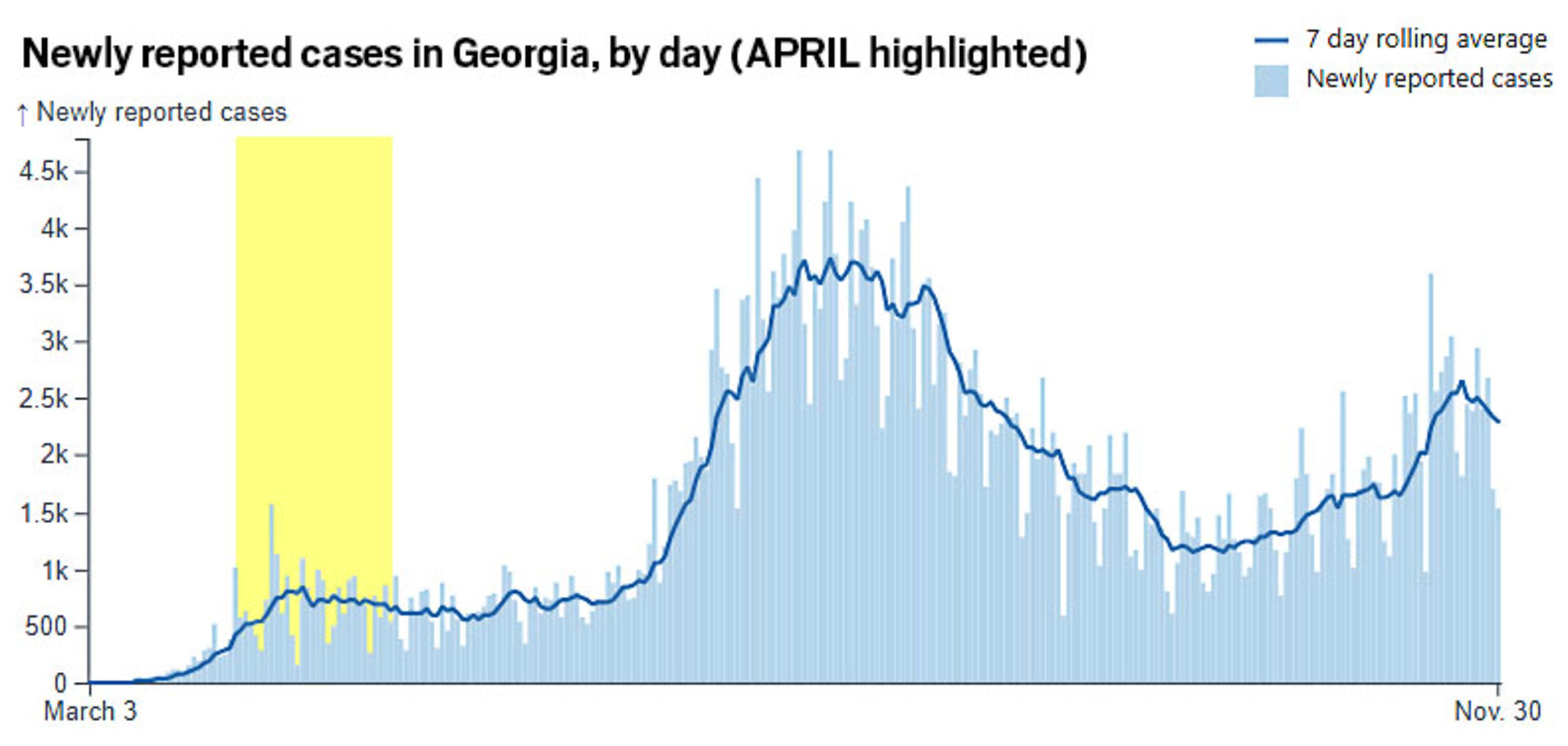
April
April 1:
• Kemp announces that K-12 schools will remain closed for the school year.
• Georgia’s largest hospitals ask patients with mild symptoms not to come in to request a test, citing test scarcity.
• The Cobb Galleria Centre and the Cobb Energy Performing Arts Centre announce their closure until further notice.
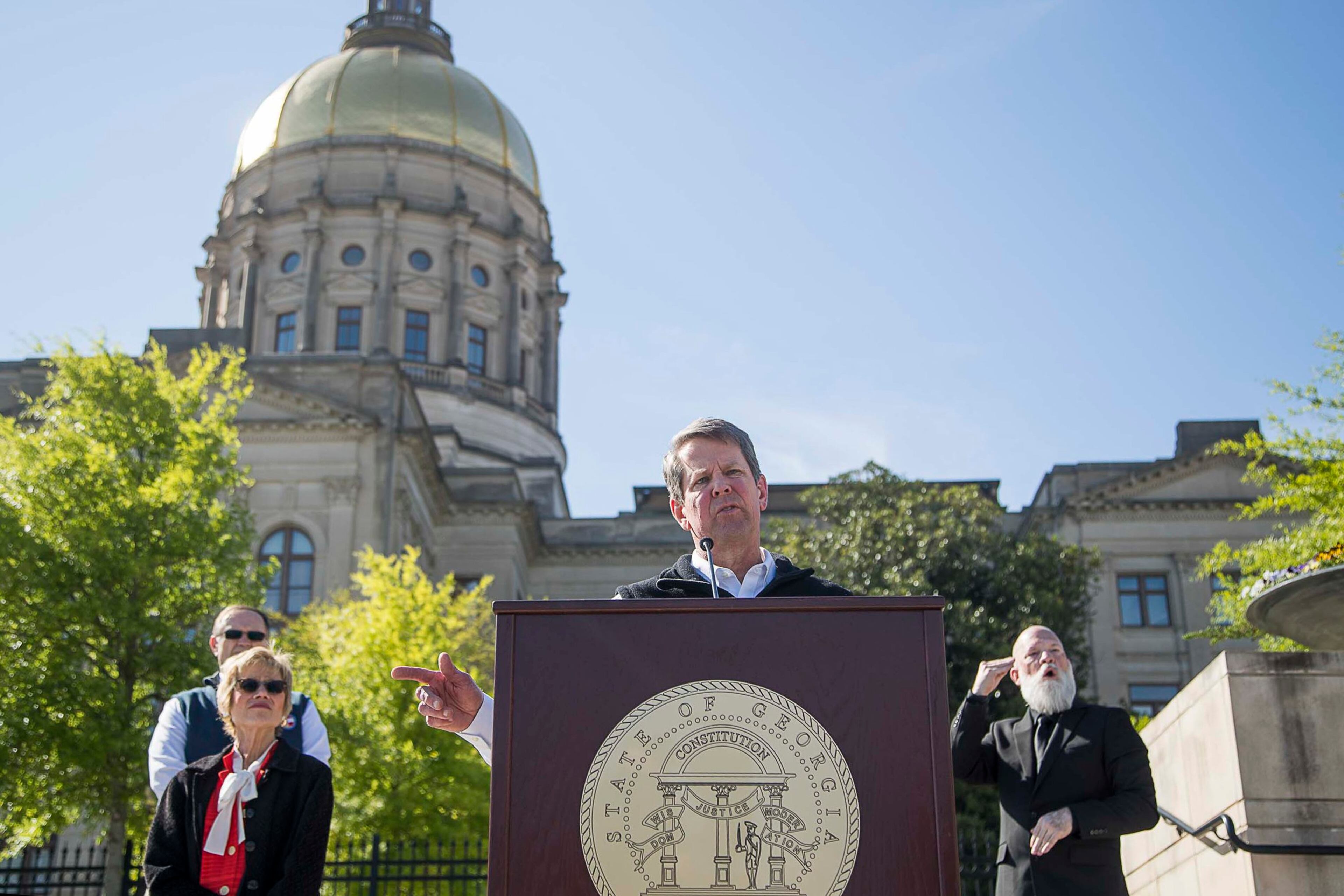
April 2: Kemp issues a statewide shelter-in-place order for the next day through April 13, overriding any orders by local governments.
April 3:
• Trump announces CDC recommendation that all Americans wear a mask when they go outside, but also says, “I don’t think I’m going to be doing it.”
• Georgia releases first list of senior care facilities with outbreaks.
April 6:
• U.S. death toll surpasses 10,000.
• CVS Health opens first drive-through rapid-testing location in Atlanta, although testing remains rationed.
April 7: Athens nursing home acknowledges that 10 residents had died of the coronavirus.
April 8: Kemp extends the public health state of emergency through May 31 and extends the shelter-at-home order through April 30.
April 13: Kemp suspends Georgia’s anti-mask statute.
April 14: Trump announces the U.S. will suspend funding to the World Health Organization, pending a review of its COVID-19 response.
April 15: Georgia DPH announces expansion in testing and says anyone with symptoms can receive a test.
April 16:
• Trump unveils guidelines for reopening the country. States would need to meet six metrics that demonstrate a downward trajectory of cases.
• Georgia reports the unemployment rate for March rose to 4.2% from historic low of 3.1% in February.
• Georgia reports 985 coronavirus cases, the peak of the first wave of the pandemic in the state.
April 19: Federal government requires nursing homes to report cases of COVID-19 to the CDC and to notify residents and families about them.
April 20: Kemp issues guidelines for reopening gyms, bowling alleys, barber shops and other businesses starting April 24.
April 21: Trump announces temporary suspension of immigration into the U.S.
April 22: Trump says he strongly disagreed with Kemp’s decision to reopen certain facilities, saying it was too soon.
April 23:
• Trump suggests ingesting disinfectants to fight the coronavirus.
• Kemp orders social distancing for all residents and limits gatherings to no more than 10 people.
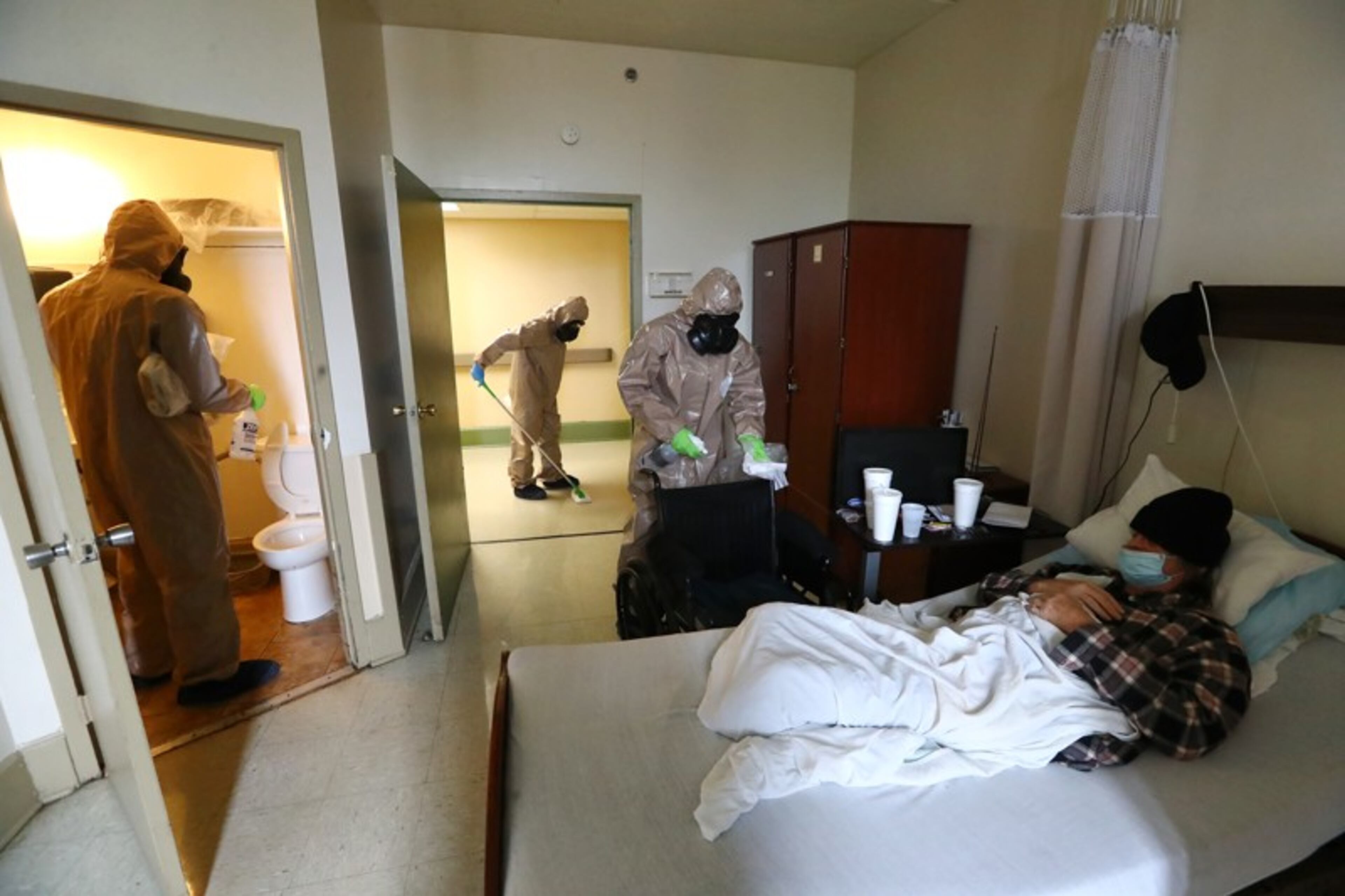
April 24:
• U.S. Department of Health and Human Services begins distributing $20 billion to health care providers.
• The Food and Drug Administration warns against the use of hydroxychloroquine, the anti-malarial drug touted by Trump.
• Georgia gyms, nail salons, tattoo parlors and some other businesses can reopen.
April 27: Kemp allows in-person dining to resume if restaurants adhere to guidelines, which include face coverings for employees.
April 28: DPH reports that at least 1,030 deaths have been linked to the virus, the first time the toll has topped 1,000.
April 29: Georgia DPH reports that nearly 400 Georgia poultry workers have tested positive.
April 30: White House officials shelve the CDC’s draft guidelines on reopening.

May
May 1:
• Trump moves to replace Christi Grimm, the HHS deputy inspector general who released a report in April on personal protective equipment (PPE) shortages.
• Kemp lifts the shelter-in-place order for most of the state’s residents.
• FDA grant emergency use authorization for the drug remdesivir.
May 3: CDC puts long-term care facilities in the highest priority group for testing.
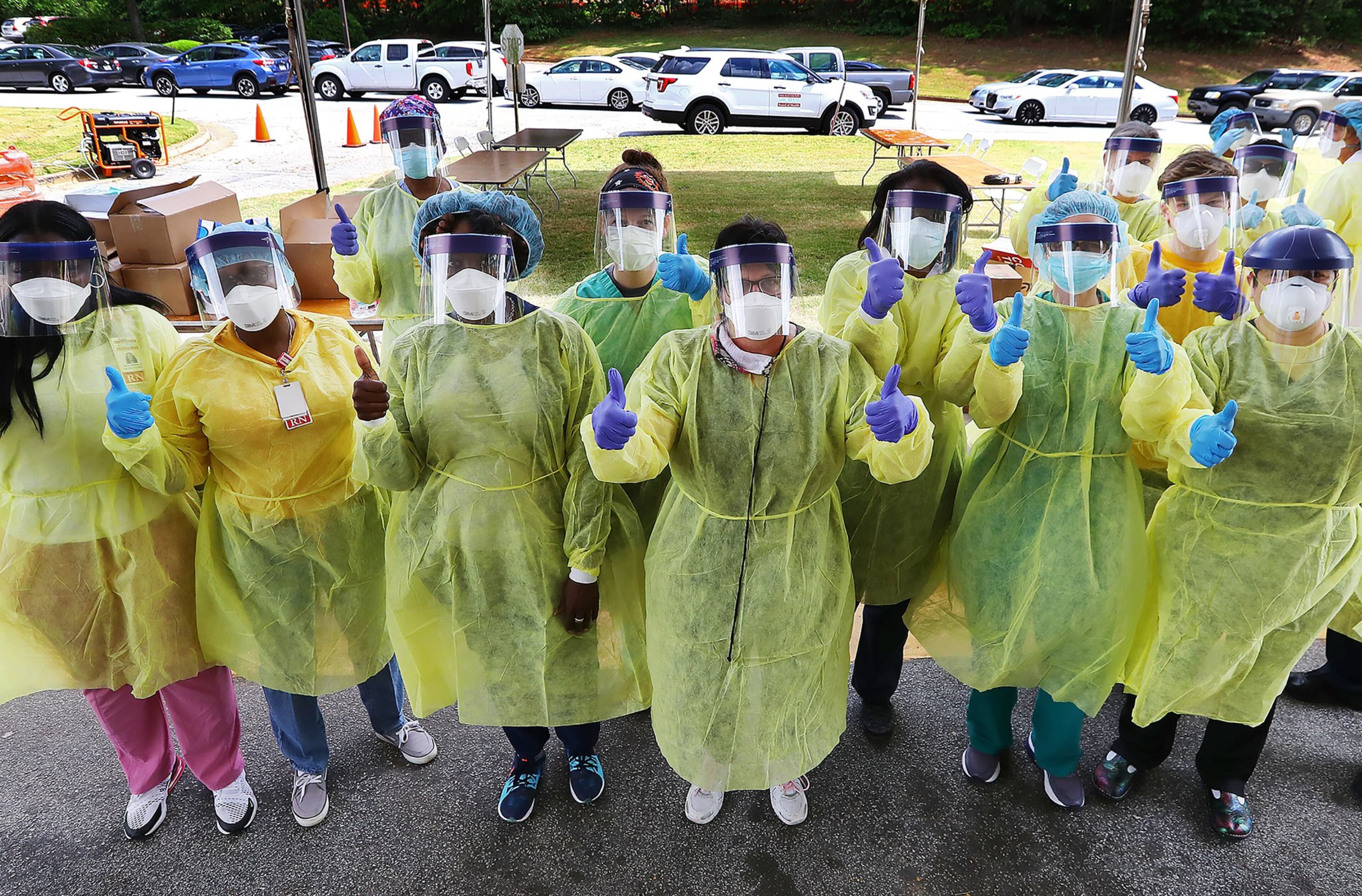
May 5: Trump says he intends to wind down the coronavirus task force. He reverses this decision the next day.
May 6: Dr. Kathleen Toomey orders those with COVID-19 and those who have come into contact with COVID-19 to immediately isolate for 14 days. Failure to comply with the order is a misdemeanor.
May 11: Pence strongly recommends to governors that all nursing home residents and staff be tested within the next two weeks. Trump declares that the U.S. has prevailed in terms of testing.
May 16: CDC quietly posts a 60-page reopening guidance document, reduced from the original 68 pages.
May 18: Federal government issues guidance for state and local officials on the reopening of nursing homes.
May 20: Georgia DPH acknowledges that it had included antibody tests with diagnostic tests in its tally of the number of tests completed, inflating published test counts by about 14%.
May 21:
• Kemp allows overnight summer camps to host campers starting May 31.
• Georgia reports unemployment rate at all-time high of 11.9% in April, later revised to 12.6%.
• The Atlanta Track Club announces that the AJC Peachtree Road Race won’t be held on July Fourth but will be rescheduled as a virtual race on Thanksgiving.
May 27: U.S. death toll surpasses 100,000.
May 28: Kemp issues order allowing bars and nightclubs to reopen with restrictions on June 1. The order also extends the public health state of emergency until July 12.
May 29: CDC holds briefing, its first since March 9.
May 30: Trump terminates U.S. relationship with the World Health Organization.
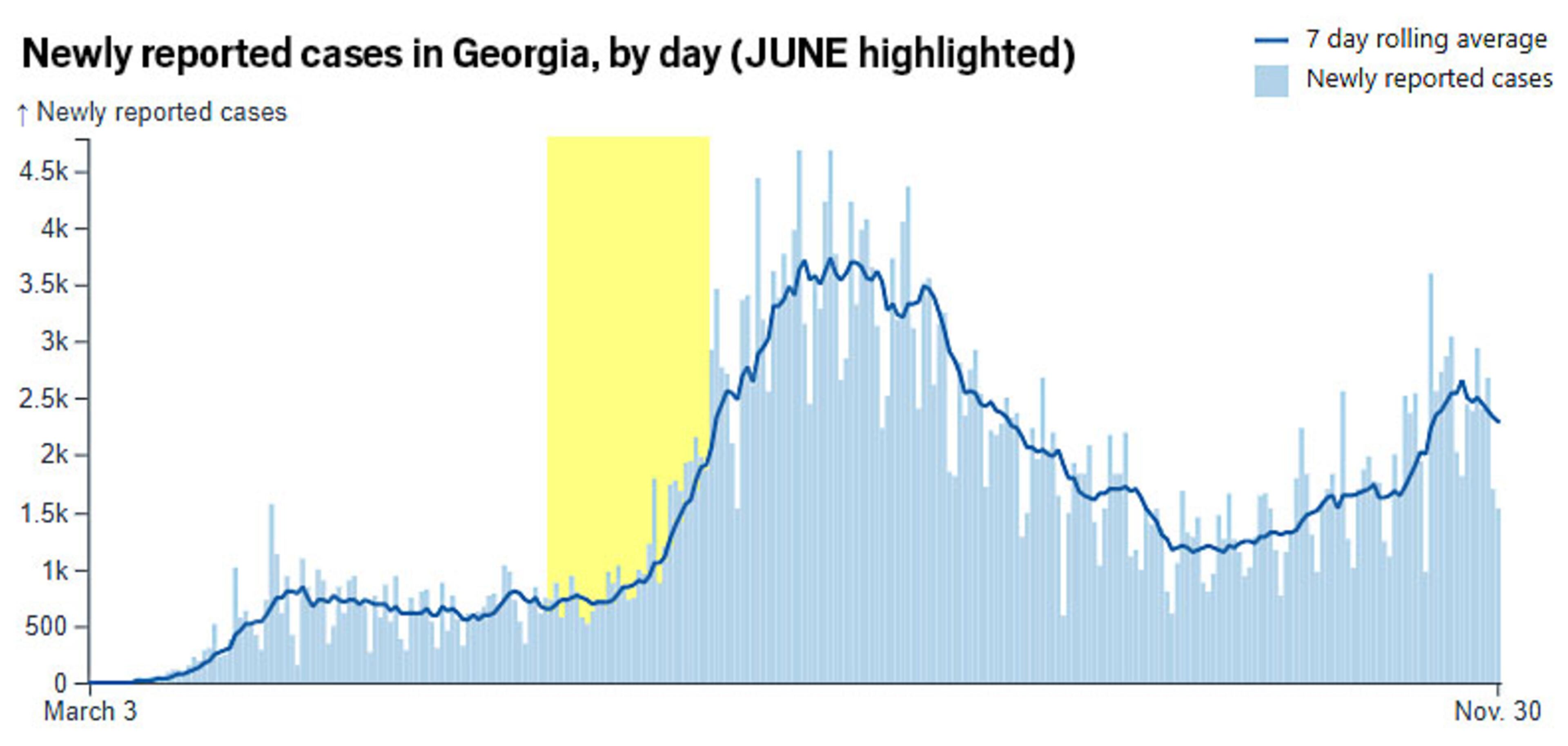
May 31: Georgia reports 2,053 COVID deaths, topping 2,000 for the first time.
June
June 1: Coronavirus deaths among Georgia long-term care residents top 1,000.
• State releases 10-page document of guidelines for reopening schools in the fall.
June 4: Once the state’s most dire hot spot, Phoebe Putney Memorial Hospital announces that it has no COVID-19 patients left in its main hospital, and 42 in Phoebe North.
June 11: Kemp issues executive order that ends the shelter-in-place mandate for most residents over 65, enables live entertainment venues to reopen on July 1, and permits larger gatherings.
June 15: FDA revokes emergency use authorization for hydroxychloroquine.
June 16: Capacity limits at Georgia restaurants are lifted and bars are allowed to accommodate up to 50 people. Employees are no longer required to wear masks unless engaging directly with patrons.
June 19: Georgia reports the unemployment rate in May dropped to 9.7% from an all-time high of 12.6% in April.
June 24: Georgia Senate approves a House bill to limit legal liability for businesses and health care providers that get sued by workers or customers who contract COVID-19 at their establishments.

June 29: Kemp extends public health state of emergency and COVID-19 safety measures, such as a ban on gatherings of more than 50 people unless there is 6 feet between each person.
June 30: For the first time since 1901, baseball’s minor league season is canceled, forcing layoffs and pay cuts.
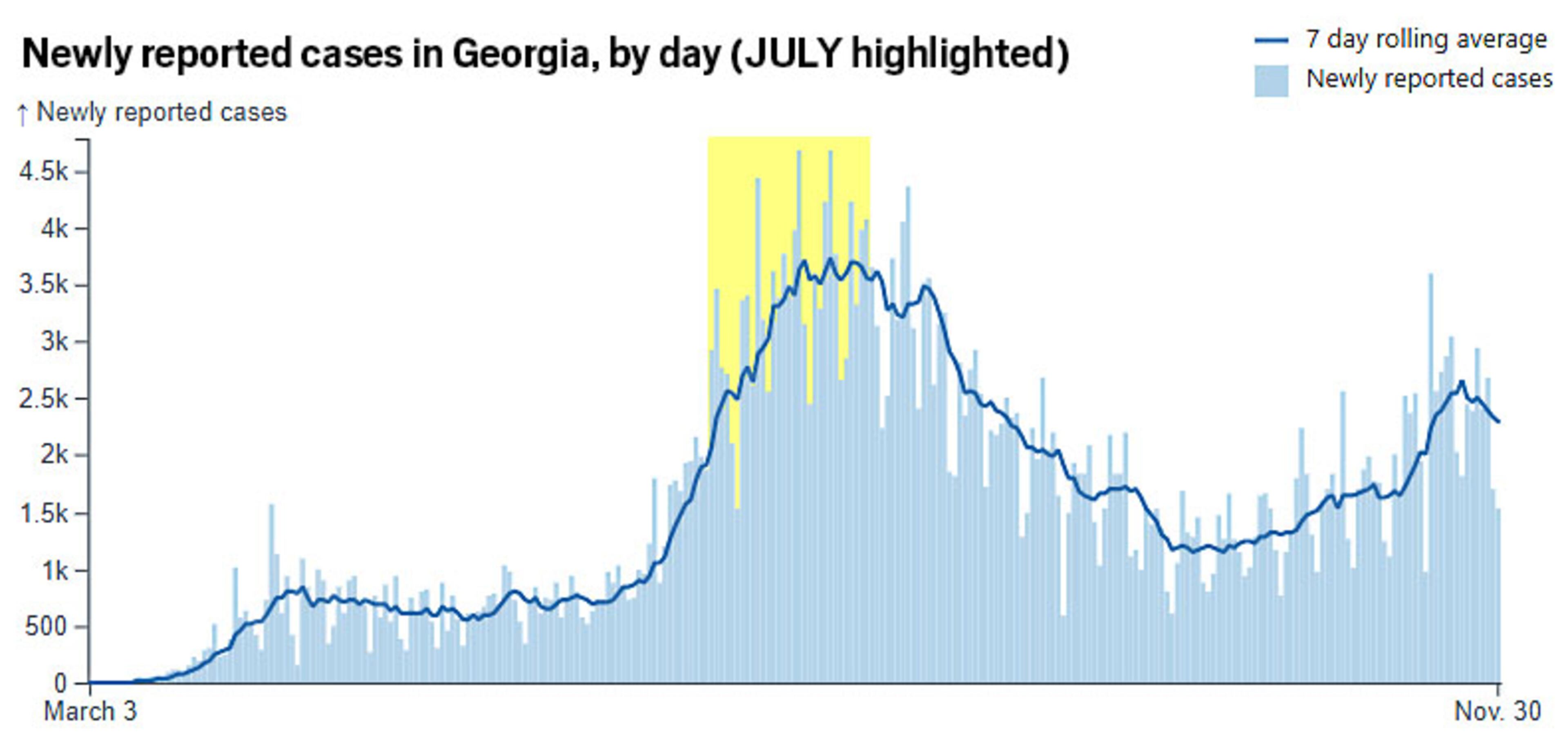
July
July 1:
• Dr. Anthony Fauci tells a Senate committee that a resurgence of COVID-19 could result in the country seeing as many as 100,000 new cases per day.
• Mask mandate takes full effect in Savannah, the first Georgia city to impose such a requirement. Athens issues one later that week.
July 6: Mayor Bottoms announces she tested positive for COVID-19.
July 8:
• Trump lashes out at CDC over its school reopening guidelines, saying they’re too tough. He also threatens to cut off federal funding to schools that don’t reopen.
• Atlanta mandates masks.
July 10: Mayor Bottoms returns city of Atlanta to Phase 1 of her reopening plan, under which residents should wear masks, restaurants should close dining rooms, nonessential city facilities should close, and individuals should leave home only for essential trips.
July 12: Georgia’s coronavirus death toll is 3,001.
July 15:
• Health and Human Services requires that hospitals now send their coronavirus data to HHS instead of to the CDC.
• Kemp bans cities and counties from mandating masks while also extending the state’s coronavirus restrictions.
July 16:
• Kemp files lawsuit against Atlanta over its mask mandate.
• State reports unemployment rate in June dropped to 7.6%.
July 22: HHS announces an agreement with Pfizer for large-scale production and delivery of 100 million doses of a COVID-19 vaccine once it is approved and manufactured.
July 23:
• CDC issues new school reopening guidelines, titled “The Importance of Reopening America’s Schools this Fall.”
• Major League Baseball begins a shortened season. Although a total of 40 games would be postponed, the season ended with a World Series champion on Oct. 27.
July 24:
• Hospitals across Georgia report being jammed with patients as they try to manage a new surge of cases.
• The state has 3,728 confirmed cases based on rolling averages, the peak of the second wave of infections in the state.
July 27: First of 30,000 volunteers receive COVID-19 experimental vaccine.

July 28: Two Georgia regions run out of beds in intensive care units, and hospitals elsewhere struggle to accommodate a new surge of COVID-19 patients.
July 30: The NBA restarts its season with a limited number of teams in a “bubble” format with daily testing and regulations. The season would end on Oct. 11.
July 31:
• Delta Air Lines says it plans to resume some international flights from Atlanta in August.
• Kemp extends Georgia’s public health state of emergency and renews COVID-19 restrictions.
• Georgia finishes infection surveys of all nursing homes, among the last states to complete the required inspections.
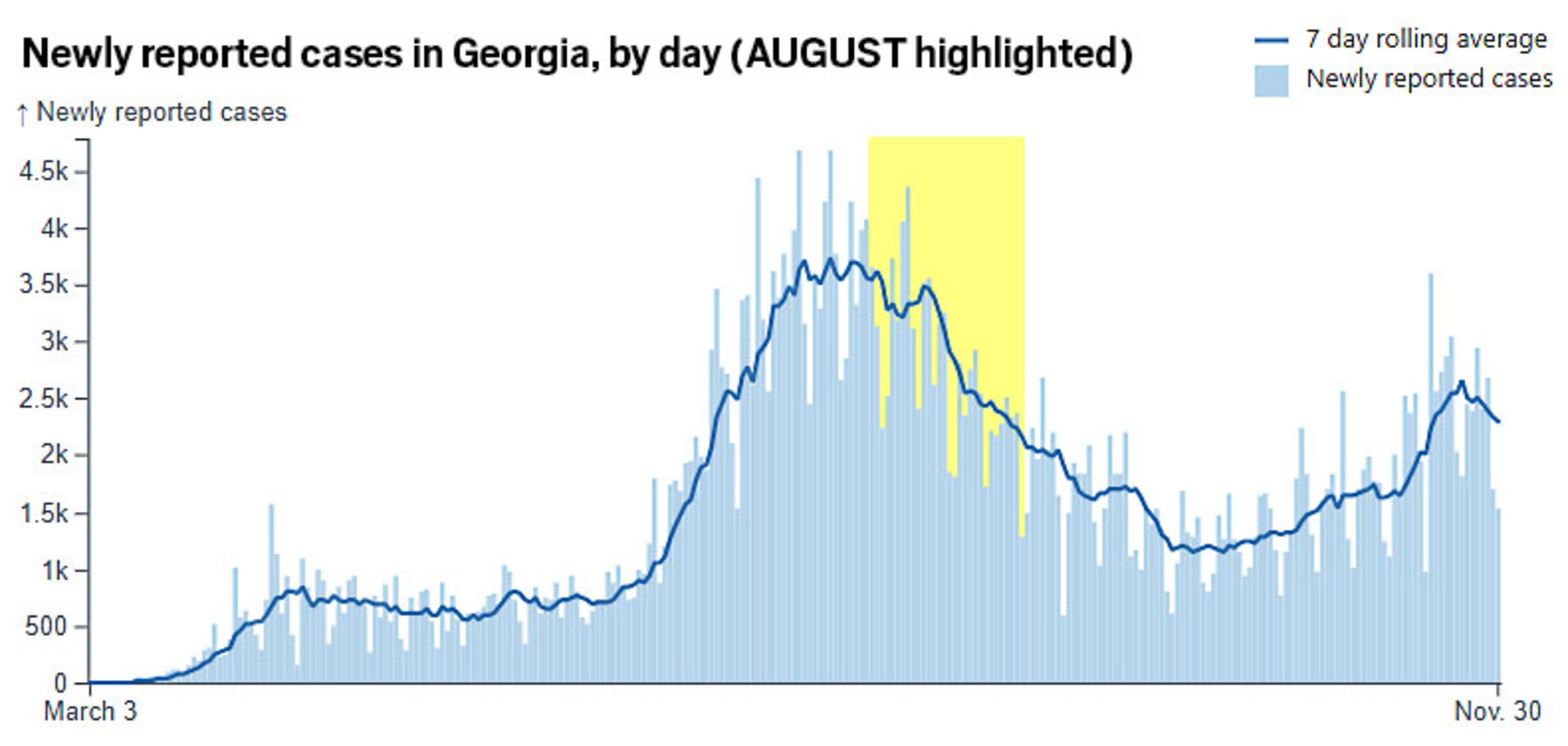
August
Aug. 3: Georgia World Congress Center reopens with surge beds to treat COVID-19 patients.
Aug. 6: The state records 4,026 coronavirus-related deaths, topping 4,000 for the first time.
Aug. 13:
• White House Task Force warns of widespread and expanding COVID-19 infections in Georgia. The report calls for a mask mandate, closing some businesses and other measures.
• Kemp drops lawsuit against Atlanta over its mask mandate.
Aug. 15: Kemp orders all residents and visitors to practice social distancing and refrain from gathering. The order also strongly encourages masks and for the first time allows local mask mandates.
Aug. 18:
• White House Coronavirus Task Force says Georgia reported the highest rate of new cases in the nation for the previous week.
• A Department of Community Health report shows 2,024 deaths in long-term care facilities, up from a reported 1,995 a day earlier.
Aug. 19: Kemp pushes back against reports of high COVID-19 infection rates in the state, lashing out at the leaked White House task force report.
Aug. 20: State announces July unemployment rate of 7.6%, unchanged from the previous month but more than double July 2019′s level of 3.4%.

Aug. 22: Georgia surpasses 5,000 COVID-19 deaths, with 5,092 reported.
Aug. 28: Georgia DPH reports that a 1-year-old Cobb County boy had died of COVID-19, the youngest victim in the state.
Aug. 31: Kemp extends order on social distancing until Sept. 15. He also renews public health state of emergency through Oct. 10.

September
Sept. 4: CDC issues order barring landlords from evicting anyone from residential properties for failure to pay rent. The order extends through year’s end.
Sept. 5: The 2020-21 college football season begins, with some conferences sitting out and limited schedules overall. The following weeks would see a large number of games canceled or postponed.
Sept. 6: DPH reports 6,037 coronavirus-related deaths, surpassing 6,000 for the first time.
Sept. 10: Kemp allows remote administration of oaths, making it possible to resume grand juries.
Sept. 11: CDC reports that asymptomatic children can spread COVID-19.
Sept. 15: Kemp issues order creating rules to allow visitors to return to long-term facilities.
Sept. 17: State reports August unemployment rate dropped to 5.7%.
Sept. 25: Georgia DPH decides to withhold information about infections at each school, saying the public has no legal right to information about school outbreaks.
Sept. 28: The world marks 1 million COVID-19 deaths, according to Johns Hopkins University.
Sept. 29: CDC reports that from early August to early September, COVID-19 infections among people 18 to 22 years old increased more than 50%.
Sept. 30: Georgia records 7,021 coronavirus-related deaths.

October
Oct. 1: The NFL, which had played without a “bubble” format, begins postponing games because of COVID-19 infections. Games over the next several weeks would continue to be postponed or rescheduled.
Oct. 2: President Trump announces that he has tested positive for COVID-19.
Oct. 15: Kemp extends state’s coronavirus restrictions until Oct. 31.
Oct. 16:
• Georgia DPH submits a 56-page COVID-19 vaccine distribution plan to the CDC.
• Georgia surpasses 7,500 recorded coronavirus deaths.
Oct. 20: CDC reports on excess deaths associated with COVID-19 and says the deaths reported so far might underestimate the total impact on mortality.
Oct. 22: FDA approves the antiviral drug remdesivir as the first treatment for COVID-19.
Oct. 30: Kemp renews his order on a public health state of emergency.
Oct. 31: White House Task Force warns that private social gatherings are a major factor in the continued spread of COVID-19 in Georgia.
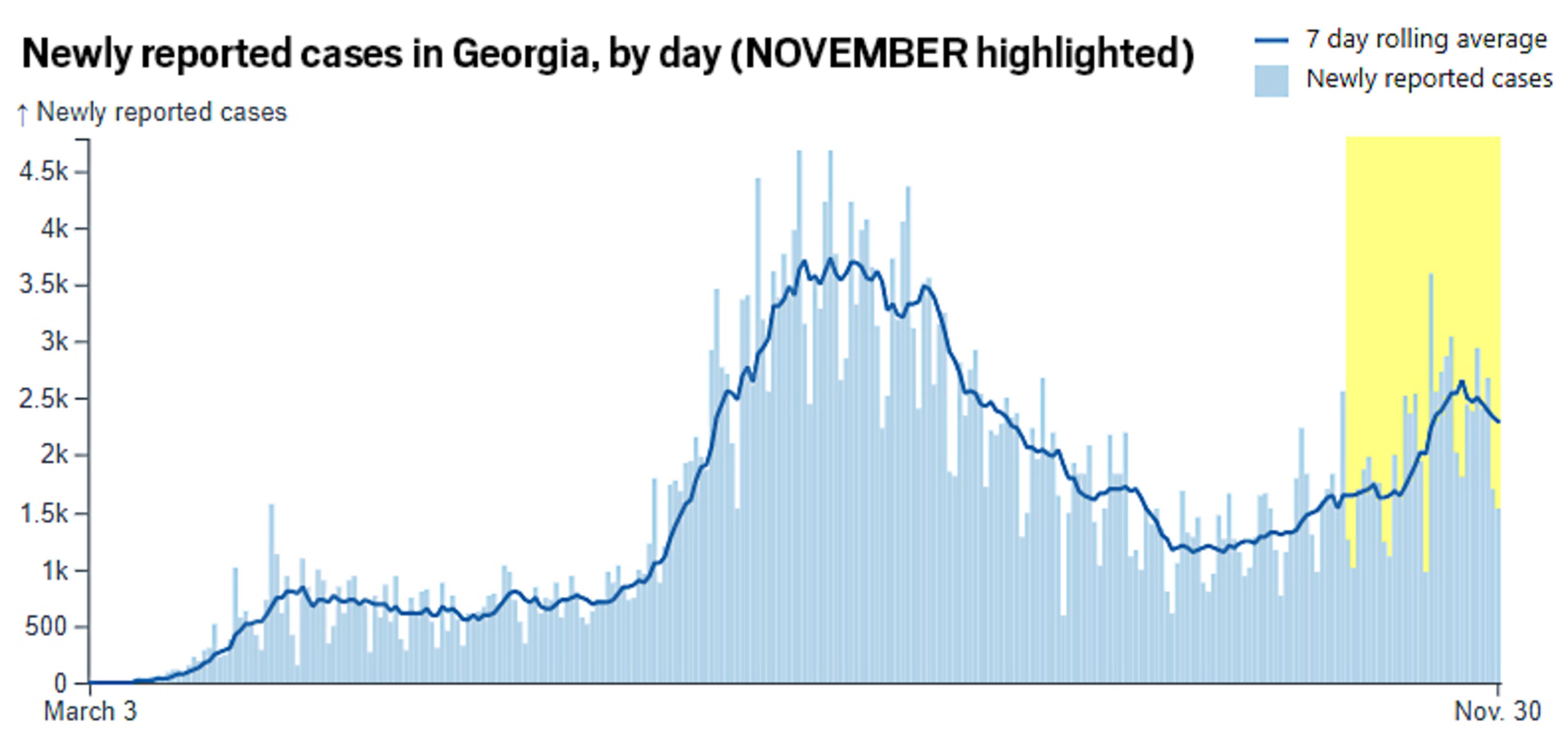
November
Nov. 3: Georgia surpasses 8,000 recorded coronavirus deaths. DPH reports 8,029 confirmed deaths. The agency also adds to its dashboard a new column on probable deaths, reporting 450 probable deaths attributed to COVID-19.
Nov. 4: U.S. for the first time records 100,000 new confirmed infections in a single day.
Nov. 9: Pfizer and its German partner BioNTech say early results show their vaccine may be 90% effective at preventing COVID-19. This is a two-shot vaccine.
Nov. 10:
• White House Task Force moves Georgia back into the red zone.
• NBA announces a 72-game schedule for the 2020-21 season to begin on Dec. 22.
Nov. 13: Kemp renews his order on a public health state of emergency, extending the provisions through Nov. 30.
Nov. 15: White House Task Force warns that an increase in test positivity in Georgia is “an early sign of future deterioration.”
Nov. 16:
• Moderna says early data shows its vaccine appears to be 94.5% effective and that it has a longer refrigeration shelf life after super-cold distribution.
• Kemp says the Georgia National Guard will lead the state’s distribution of the COVID-19 vaccine once it’s available. He says counties and hospitals are planning for cold storage.
Nov. 17:
• The Hill reports that the CDC has quietly removed from its website controversial guidance that pushed for schools to reopen in the fall.
• FDA authorizes the first COVID-19 test for self-testing at home.
• Confirmed deaths in Georgia long-term care facilities top 2,800.

Nov. 19:
• World Health Organization says someone in Europe is dying from COVID-19 every 17 seconds, while in the United States, CNN says the coronavirus is killing one American every minute.
• With U.S. death toll surpassing 250,000, CDC urges people to stay home for Thanksgiving.
• State reports unemployment rate dropped to 4.5% in October.
Nov. 20: Pfizer and its German partner BioNTech file for emergency use authorization for their vaccine.
Nov. 21: FDA issues emergency use authorization for IV infusion of the investigational medicines Casirivimab and Imdevimab that use monoclonal antibodies to treat mild to moderate COVID-19 cases.
Nov. 23:
• AstraZeneca announces that its vaccine is up to 90% effective.
• Despite CDC guidance that people not travel for Thanksgiving, Atlanta’s Hartsfield-Jackson International Airport sees its busiest day since the early part of the pandemic.
Nov. 25:
• AstraZeneca acknowledges that a “manufacturing error” may have compromised the results of its promising vaccine tests.
• Trump issues proclamation encouraging all Americans to gather on Thanksgiving.
• DPH reports a rate of 313 infections per 100,000 people. But that calculation doesn’t include results from positive antigen tests. The AJC found that including those tests, the rate would be 412 infections per 100,000.
Nov. 30: Moderna files for emergency use authorization for its vaccine.
December
Dec. 1: CDC advisory panel recommends that first vaccine doses should go to health care workers and residents of long-term care facilities.
Dec. 2:
• British officials authorize the vaccine developed by Pfizer and BioNTech for emergency use, marking the first time a coronavirus vaccine has been officially approved by any country.
• Coronavirus patients in U.S. hospitals exceed 100,000 for the first time, nearly double the number from spring during the virus’s deadly first wave, according to The New York Times.
Dec. 3: Georgia DPH reports that the regions around Athens and Valdosta each had just two ICU beds remaining.
Dec. 4: Georgia sets a single-day coronavirus record for confirmed and probable cases. The state saw 4,947 net new confirmed infections and 1,429 net new antigen positive tests, for a total of 6,376.
Dec. 7: Georgia surpasses 9,000 confirmed COVID-related deaths, reporting 9,007.
Dec. 8:
• Margaret Keenan, 90, becomes the first person in the U.K. to receive the Pfizer/BioNTech vaccine.
• Biden says that his incoming administration will provide 100 million vaccinations in his first 100 days in office.
• At a news conference, Kemp expresses concern about the rise in cases, as the number of people hospitalized was at its highest point since August. But he does not announce any new coronavirus restrictions.
Dec. 11:
• FDA allows the Pfizer COVID-19 vaccine for emergency use.
• Georgia reports 3,008 deaths among residents of long-term care facilities, up from 2,999 a day earlier.
Dec. 14:
• The Pfizer/BioNTech vaccine begins to be administered in the United States. Sandra Lindsay, an ICU nurse at Long Island Jewish Medical Center in Queens, becomes the first person in the U.S to receive it.
• Five nurses in the Savannah area receive the state’s first doses of the Pfizer COVID-19 vaccine outside of clinical trials.
Dec. 17:
• The FDA authorizes the Moderna vaccine for emergency use.
• Georgia is among several states reporting that their expected allotments of the Pfizer-BioNTech vaccines for the coming weeks have been cut by 40%.
Dec. 20: The CDC advisory panel recommends that the second wave of vaccinations should be given to people 75 and older, as well as certain front-line essential workers such as first responders, teachers, postal employees and public transit workers.
Dec. 21: The Georgia Department of Public Health launches a vaccine dashboard to track the number of providers enrolled and the number of doses requested and administered.
Dec. 23: Doses of the Moderna vaccine are due to arrive in Georgia by this date at the latest. The vaccine was being shipped directly to providers.
Dec. 24: The state reports a record number of coronavirus cases, with 10,346 confirmed and probable cases. The number of confirmed COVID deaths increased by 53.
Dec. 26: The highly contagious U.K. strain of the virus is documented in several European countries, Japan, Australia and Lebanon, despite efforts to cut its spread.
Dec. 28: Doses of coronavirus vaccine start to arrive at some nursing homes in Georgia.
Dec. 29:
• State data show 4,437 people hospitalized for COVID-19 in Georgia, more than three times the number hospitalized in mid-October and nearly 40% more than the summer peak.
• The first reported U.S. case of the highly contagious U.K. variant of the virus is discovered in Colorado.
Dec. 31:
• Georgia World Congress Center reopens a third time as a relief valve to crowded hospitals.
• Georgia ends 2020 with its worst day for net new confirmed and suspected cases of COVID-19.
• The state announces it will expand the list of those eligible for inoculation to anyone age 65 and older, police officers and firefighters.
January 2021
Jan. 1: Supreme Court Chief Justice Harold Melton again suspends jury trials.
Jan. 5: Georgia announces its first confirmed case of the U.K. coronavirus variant.
Jan. 6:
• U.S. records the deadliest day so far of the pandemic, with more than 2,900 deaths and 255,000 new cases reported. The record came one day after the U.S. broke the previous record.
• On this day, Georgia also officially recorded more than 10,000 confirmed coronavirus deaths. The state reports another 1,130 probable deaths.
Jan. 7: Kemp issues an executive order allowing EMTs and cardiac technicians to administer vaccines.
Jan. 8:
• Facing mounting complaints about the vaccine rollout, Gov Kemp announces the state would launch an information hub where Georgians could see where they could go to book appointments.
• Georgia hospitals are overwhelmed with COVID patients, with some regions of the state having no ICU beds available, while other regions had only a handful open.
Jan. 11:
• The state officially opens vaccine eligible to those 65 and older and launches a vaccination locator website. But it led to busy or wrong phone numbers and websites that crashed as they were overwhelmed.
• Including probable cases, the state hits 9,801 cases based on rolling averages.
• This is the peak of the pandemic’s third wave in Georgia, with 7,397 cases.
• CVS begins vaccination in Georgia assisted living and personal care homes under the federal contract.
Jan. 12:
• U.S. Health and Human Services Secretary Alex Azar says that the federal government will release all doses of the COVID-19 vaccine it has in reserve to accelerate immunizations. He also urges states to expand eligibility to everyone 65 and older and to adults with serious underlying health conditions.
• Georgia reports 145 net new confirmed COVID deaths.
Jan. 13: Georgia’s rolling average of daily reported deaths reaches an all-time high, as the number of people hospitalized for the disease is also at record highs. Health authorities reported 136 new confirmed deaths and another 5 deemed probable.
Jan. 15:
• Azar indicates that the federal vaccine reserve was already exhausted when he announced that the government would release its stockpile, meaning no additional doses would be coming to states to ramp up vaccinations.
• A CDC report warns that the more transmissible U.K. strain of the first could spread rapidly and become the dominant one in the U.S. as soon as March.
Jan. 16: Georgia’s death toll tops 11,000, as infections are surging across the state. In the past 10 days, the state has confirmed nearly 1,000 additional deaths.
Jan. 19:
• The U.S. COVID death toll surpasses 400,000.
• Georgia Public Health Commissioner Dr. Kathleen Toomey reiterates that vaccine providers should administer all the doses they have and not hold back supplies for booster shots. The word comes as seniors who had the first dose struggled to get appointments for the second.
Jan. 21:
• The state surpasses 700,000 confirmed cases of COVID-19, an increase of about 100,000 in just two weeks. It also has five confirmed cases of the U.S. variant, according to CDC.
• Kemp announces that starting next week, 40,000 vaccine doses that were being sent to CVS and Walgreens each week for nursing home residents will be available for use by other providers, increasing the state’s weekly vaccination capacity to about 120,000 doses. But he says demand for vaccine far outstrips supply.
• The Biden administration takes steps to keep the U.S. in the World Health Organization, revoking a Trump administration order that would have pulled the U.S. out of the U.N. agency this summer.
Jan. 22: Kemp issues an emergency order to allow medical assistants, physician assistants and advance practice nurses to administer COVID-19 vaccine without direct on-site supervision.
Jan. 24:
• New CDC Director Dr. Rochelle Walensky warns that the federal government doesn’t know how much coronavirus vaccine the nation has.
• The U.S. passes 25 million confirmed cases.
Jan. 25:
• President Biden reinstates COVID-19 travel restrictions on most non-U.S. travelers from the U.K., 26 other European countries, Ireland and Brazil. He also adds South Africa to the list because of concerns about a virus variant there.
• CVS and Walgreens say they have completed the first round of vaccinations at nursing homes nationwide.
Jan. 26:
• CDC says it is safe to reopen schools if proper precautions are taken, citing research that shows schools have not contributed meaningfullly to outbreaks.
• Biden raises the federal vaccination goal to 1.5 million shots a day.
Jan. 27:
• The state suspends shipments of coronavirus vaccine to the Medical Center of Elberton for six months after it prioritized doses for teachers in the local school system.
• Georgia reports 12,135 COVID deaths, the first time the toll has topped 12,000.
Jan. 29: Johnson & Johnson announced that its investigational single-dose COVID-19 vaccine candidate was 72% effective in the U.S. and 66% effective overall at preventing moderate to severe COVID-19, 28 days after vaccination. Overall, clinical trials showed it was 85% effective in preventing hospitalizations and deaths.
Jan 31: January proves to be the deadliest month to date of the pandemic with 2,698 additional deaths from COVID-19 confirmed. That brought the state total to 12,570. While the number of new cases edged down, the numbers still outpace levels reached at a previous peak in July.
Feb. 1:
• In an unanimous vote, the Atlanta school board approves a resolution urging the state to begin vaccinating teachers.
• Georgia Department of Public Health confirms 19 people in nine Georgia counties have been infected with the U.K. variant, but experts said they believe the actual number was exponentially higher.
Feb. 2: The number of resident deaths from COVID-19 at Georgia long-term care facilities soars past 4,000. The day before, a Department of Community Health report showed 3,991 deaths. On this date, DCH reports 4,046.
Feb. 4:
• The state records more than 13,000 COVID deaths.
• Gov. Kemp denies the request from the Atlanta school board to move teachers higher up in line for vaccines.
• Johnson & Johnson announces that Janssen Biotech had asked the Food and Drug Administration to grant emergency use authorization for its single-dose vaccine candidate.
• Lakers star LeBron James is among top NBA players questioning playing the All-Star game in Atlanta on March 7, amid the pandemic.
Feb. 6: The state reports 179 confirmed COVID-19 deaths since the previous day, the most since the pandemic began. The overall total increased to 13,324 confirmed deaths. DPH reports that another 1,766 deaths were probably related to the virus.
Feb. 8: The number of confirmed UK variant cases in Georgia increases to 37, with almost all the cases in the greater Atlanta metro area.
Feb. 12: Georgia reports 187 new deaths, the biggest one-day increase since the start of the pandemic. The state also identifies 45 cases of the variant virus first identified in the U.K., though public health officials say the virus is likely widespread in Georgia.
Feb. 16: Georgia surpassed 14,000 COVID-19 deaths, bringing the official state total to 14,176.
Feb. 19: Georgia reports 173 additional deaths.
Feb. 22: Georgia opens four state-run vaccination sites. The sites are in Albany, Macon, Habersham County and Hapeville, at the Delta Museum.
Feb. 26:
• Georgia surpasses 15,000 coronavirus deaths, with 15,007 reported.
• An advisory committee for the Food and Drug Administration unanimously recommends emergency use authorization be granted for Johnson & Johnson’s single-dose COVID-19 vaccine for adults.
Feb. 27:
• Georgia World Congress Center discharges its last patient.
• The FDA issues emergency use authorization for the J&J vaccine.
Feb. 28: Georgia long-term care facilities report 225 additional COVID-19 deaths in February, down from more than 1,100 in January, as the number of new cases at the facilities also plunges.
March 3: Gov. Kemp announces five additional state-run vaccination sites, to begin operation march 17. The sites will be in Chatham, Ware, Washington, Bartow and Muscogee counties.
March 5: The White House announces plans to soon administer 42,000 doses a week at Mercedes-Benz stadium, a site selected to help reach hard-hit, high-risk communities. The site is to operate seven days a week for an eight-week period. The news comes as Georgia records the first case of the variant virus that emerged in South Africa.
March 8: Vaccinations begin for teachers and other school employees.
March 10: CMS issues new guidelines that allow indoor visitation to resume at nursing homes, with some limits.
March 11: Novavax announces that its vaccine is 96.4% effective against the original strain of the coronavirus, and provides 100% protection against severe disease. The company also said the vaccine is 86% effective against the variant identified in the U.K. and 55% effective in a small trial in South Africa, where another variant is endemic.
March 15: Georgia opens vaccinations to all those 55 and older, as well as those with high-risk medical conditions, which will likely make the vast majority of Georgia adults qualified to get the shots.

